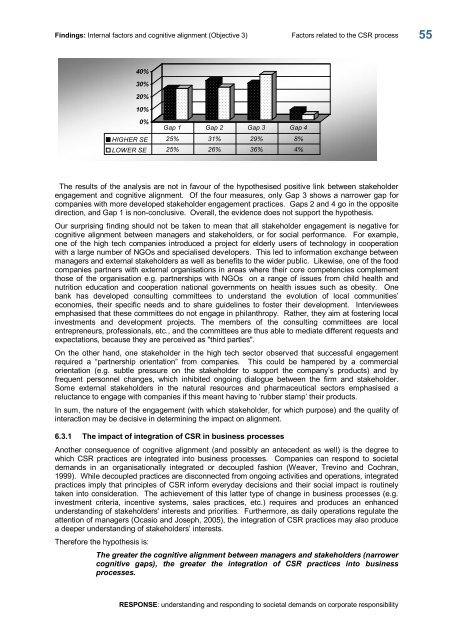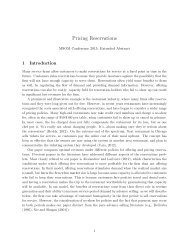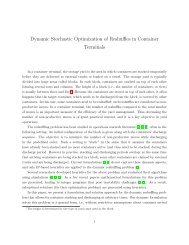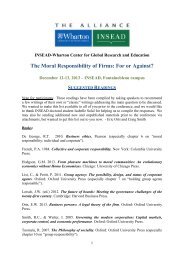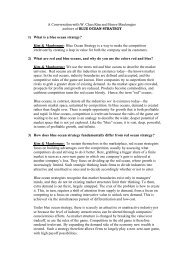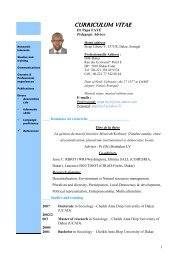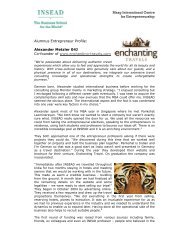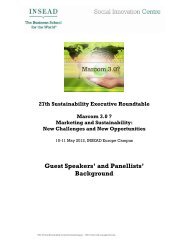RESPONSE - Insead
RESPONSE - Insead
RESPONSE - Insead
You also want an ePaper? Increase the reach of your titles
YUMPU automatically turns print PDFs into web optimized ePapers that Google loves.
Findings: Internal factors and cognitive alignment (Objective 3) Factors related to the CSR process<br />
40%<br />
30%<br />
20%<br />
10%<br />
0%<br />
Gap 1 Gap 2 Gap 3 Gap 4<br />
HIGHER SE 25% 31% 29% 8%<br />
LOWER SE 25% 26% 36% 4%<br />
The results of the analysis are not in favour of the hypothesised positive link between stakeholder<br />
engagement and cognitive alignment. Of the four measures, only Gap 3 shows a narrower gap for<br />
companies with more developed stakeholder engagement practices. Gaps 2 and 4 go in the opposite<br />
direction, and Gap 1 is nonconclusive. Overall, the evidence does not support the hypothesis.<br />
Our surprising finding should not be taken to mean that all stakeholder engagement is negative for<br />
cognitive alignment between managers and stakeholders, or for social performance. For example,<br />
one of the high tech companies introduced a project for elderly users of technology in cooperation<br />
with a large number of NGOs and specialised developers. This led to information exchange between<br />
managers and external stakeholders as well as benefits to the wider public. Likewise, one of the food<br />
companies partners with external organisations in areas where their core competencies complement<br />
those of the organisation e.g. partnerships with NGOs on a range of issues from child health and<br />
nutrition education and cooperation national governments on health issues such as obesity. One<br />
bank has developed consulting committees to understand the evolution of local communities’<br />
economies, their specific needs and to share guidelines to foster their development. Interviewees<br />
emphasised that these committees do not engage in philanthropy. Rather, they aim at fostering local<br />
investments and development projects. The members of the consulting committees are local<br />
entrepreneurs, professionals, etc., and the committees are thus able to mediate different requests and<br />
expectations, because they are perceived as "third parties".<br />
On the other hand, one stakeholder in the high tech sector observed that successful engagement<br />
required a “partnership orientation” from companies. This could be hampered by a commercial<br />
orientation (e.g. subtle pressure on the stakeholder to support the company’s products) and by<br />
frequent personnel changes, which inhibited ongoing dialogue between the firm and stakeholder.<br />
Some external stakeholders in the natural resources and pharmaceutical sectors emphasised a<br />
reluctance to engage with companies if this meant having to ‘rubber stamp’ their products.<br />
In sum, the nature of the engagement (with which stakeholder, for which purpose) and the quality of<br />
interaction may be decisive in determining the impact on alignment.<br />
6.3.1 The impact of integration of CSR in business processes<br />
Another consequence of cognitive alignment (and possibly an antecedent as well) is the degree to<br />
which CSR practices are integrated into business processes. Companies can respond to societal<br />
demands in an organisationally integrated or decoupled fashion (Weaver, Trevino and Cochran,<br />
1999). While decoupled practices are disconnected from ongoing activities and operations, integrated<br />
practices imply that principles of CSR inform everyday decisions and their social impact is routinely<br />
taken into consideration. The achievement of this latter type of change in business processes (e.g.<br />
investment criteria, incentive systems, sales practices, etc.) requires and produces an enhanced<br />
understanding of stakeholders' interests and priorities. Furthermore, as daily operations regulate the<br />
attention of managers (Ocasio and Joseph, 2005), the integration of CSR practices may also produce<br />
a deeper understanding of stakeholders’ interests.<br />
Therefore the hypothesis is:<br />
The greater the cognitive alignment between managers and stakeholders (narrower<br />
cognitive gaps), the greater the integration of CSR practices into business<br />
processes.<br />
<strong>RESPONSE</strong>: understanding and responding to societal demands on corporate responsibility<br />
55


